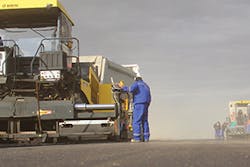Popular online videos typically don’t include the words “concrete pavers.” But views don’t lie. One video of a concrete paver laying a highway route boasts 528,000 views, showing just how fascinated some people are with the process of spreading gigantic mounds of sand-like concrete into a satisfyingly flat slab.
Concrete pavers aren’t just eye candy for YouTube viewers. They’re also essential machines when one needs to create a sidewalk, ditch, wall, road, bridge deck, and other infrastructure. If they break down mid-job, an entire crew is faced with waiting until another machine can be located—or worse, the back-breaking task of laying perfectly flat roads by hand.
To keep concrete pavers, as well as other equipment used in the process of paving concrete, functioning properly on these essential jobs, they require proper lubrication, oiling, and maintenance of their oil and lubrication lines.
Concrete pavers, naturally, regularly handle thick, gunky concrete, so any oils and lubricants for this sort of equipment must be designed to hold up to regular exposure to contamination, says Tony Negri, commercial product manager at Phillips 66 Lubricants, headquartered in Houston, TX.
“As a general rule, products for this category of equipment are developed for longevity and must be able to handle contaminants from external sources,” says Negri. “For example, most greases used in construction are very resistant to water wash out.”
Like all on-site construction equipment, concrete pavers require regular engine oil changes, hydraulic oil changes, and reapplication of lubrication between moving parts. If not done properly, the fluid lines can become congested and gunked up, causing parts to become inoperable until they receive maintenance. If lubrication is ignored, metal joints can scrape against one another, causing damage that could potentially be quite expensive.
Concrete pavers use heavy-duty diesel engine oil that is meant to last longer in high-temperature environments like a paver engine, Negri says. Using the right type of oil is essential for the longevity of the engine and the machine as a whole. Using a cheaper, less quality engine oil will result in negative impacts on your valuable equipment.
“Road construction and other vocational applications require premium lubricants for long-term protection,” he says.
Slipform paving, in particular, requires oil that can endure high temperatures, prevents the buildup of contaminants, and prevents sludge buildup. If the incorrect type of oil is used—or if maintenance is neglected—deposits could settle into the engine or sludge could form in the engine. Either of these (or a combination) would require significant maintenance—an expense that can be prevented by routine oil changes.
Engine oil changes and hydraulic line oil changes are an important part of any equipment fleet upkeep. With concrete pavers, oil change schedules and grease application intervals are determined and provided by component manufacturers or original equipment manufacturer, Negri says.
“These are typically based on operating conditions which include factors such as ambient temperature, dusty conditions, or a wet environment,” he says.
A sweltering, humid summer day in Florida and a frigid, icy day in Chicago would both call for a more robust oil. A dusty, dirty, windy, or stormy day would also toss around more contaminants, so oil choices should be considered in light of those conditions.
“For example, when a truck drives across hundreds of miles during a heat wave, the oil loses its thickness,” according to MacAllister Machinery Company Inc., based in Indianapolis, IN. “It then acts less like a lubricant and more like dirty water within the engine. Thermal distress on an oil supply can also cause harmful chemical reactions within the oil such as oxidation, which shortens the duration of your oil change interval.”
The temperature can affect oil health and cause the engine to suffer by not giving it enough lubrication. Hot and cold temperatures can cause issues, as well as rain, sleet, snow, and hail.
“In bitter cold temperatures, the oil could thicken. Instead of moving freely, engine parts would slow down because of sludge from the thickened oil. Thick oil is hard on equipment during startup because it wears on the bearings that are struggling to start your vehicle.”
When choosing the oils for your concrete paver, it’s important to keep several factors in mind: viscosity, oil oxidation, which oil category is appropriate for your current needs, traditional oil versus synthetic oil, and road conditions.
A current consideration for modern engines is oil oxidation. This occurs at higher temperatures, such as inside a concrete paver, and the oxygen inside the crankcase inside the engine reacts and can seriously thicken the oil, preventing it from flowing properly. Picking an oil that can limit oxidation within high-temperature environments can limit this potential problem.
Initial conditions themselves cause issues for concrete pavers, according to MacAllister Machinery Company.
“Various external factors can impact oil quality. Dirty roads, for example, can expose equipment to various contaminants, such as when you drive across stretches of dirt and junk that get sucked up from below the chassis. Polluted environments also expose your engine to airborne pollutants, like smoke from nearby factories,” the company’s website states. “On humid days, there’s an increased chance that airborne contaminants will reach your engine through the combustion chamber. On these days, the humidity circulates dirt through the air more and turns dusty routes into virtual airfields of oil contamination.”
Negri says many replacement schedules can be extended with the use of a premium quality synthetic blend of full synthetic lubricant. It’s also possible to get more specific maintenance schedules by completing an oil monitoring program.
“In the case of engine oils and power transmission fluids, the use of an oil analysis program should be strongly considered,” he says. “An oil monitoring program can provide an early warning of any potential engine failures or other component problems.”
Bernie Hall, general manager of Checkfluid Inc., based in Ontario (ON), Canada, says oil analysis programs are some of the best maintenance strategies that any construction company using concrete pavers can use to help keep their equipment properly oiled and lubricated on time.
“It is a key component of the reliability of a concrete paver and the financial success of the paving company,” he says.
Creating an oil analysis program consists of several parts: initial program creation, making a strategy for oil sampling, creating a system for sample data collection, management and analysis, managing diagnostics based on data inputs, and cost/benefit analysis post-diagnostics, along with performance tracking. In an oil analysis, oil is collected from various parts of the concrete paver, analyzed for water percentage, sediment, and sludge, and evaluated based on prior tests and industry standards.
Hall says oil analysis programs allow companies to be proactive in their oil changing and lubrication approach by monitoring possible contamination before it becomes a problem and changing lubricant properties to fit existing conditions. This allows companies to change oil predictively, rather than reflexively, by checking for debris that can cause damaging wear and tear and other early signs of failure.
He says a well-run oil analysis program allows companies to move to condition-based oil changes, which means changing the engine and hydraulic oil based on its actual, in-the-field condition. This reduces waste when oil is not dirty enough to merit an oil change, plus accelerates some schedules if a particularly dirty job site or tough job makes it necessary to change the oil more frequently. Hall says this condition-based oil change schedule can replace time-based oil changes, which are simply oil changes at a predetermined interval, regardless of the actual condition of the equipment and its oil.
Sampling more frequently than the manufacturer’s recommendations can optimize the oil change and maintenance process. Demanding operating conditions can trigger alert reports, which indicate the need for preventative maintenance. This proactive approach in regard to lubrication and oil replacement schedules can help extend equipment life and help avoid critical downtime that costs time and money in labor and extra maintenance or replacement.
He says another alternative is extending the oil drain interval when conditions are less harsh, which can mean equipment can be used for longer with more uptime, less lubricant cost, and more revenue overall. Saving the best quality oils for the hardest jobs can be a strategy with its own costs and benefits. He says it’s best to check with your manufacturer’s representative who can provide more information before opting for lower-quality oils.
When doing oil sampling for an oil analysis program, it’s important to keep in mind that “the most important thing about oil analysis is the oil sample,” says Hall.
The American Petroleum Institute (API) and the European Automobile Manufacturers Association (ACEA) select diesel engine oils that have been determined to have the best properties for engine protection to ensure long service intervals, MacAllister Machinery Company says. Choosing oils that have been vetted by these organizations is a good first step, but due diligence must still be taken by equipment owners to ensure the best oil for the pavers’ specific conditions is being selected.
“Still, even the best oils on the market can break down because of vehicle issues that degrade the quality of oil over an interval,” according to the company. “The performance of the oil itself consists of two factors: the quality and age of the oil, and the grade of the oil used. If the oil is a lower grade than what’s needed for your vehicle, you’ll need an oil change sooner than expected.”
The fact that a concrete paver is typically always running—downtime really only happens when the job is actually completed—and the significant risk of a breakdown means a sampling process for an oil analysis must be “NASCAR precise,” says Hall.
Downtime in the middle of a job can be disastrous. It can delay the job, cost money in labor and maintenance costs, and could frustrate an important client who expected a specific timeframe to be adhered to based on your contract. Road closures for lane expansions may have to be extended, frustrating commuters and local transportation authorities. In some cases, you can lose time-based bonuses due to unnecessary breakdowns.
Long story short: delays are never good news. To avoid that, a precise measurement with oil sampling is key.
It’s important to make sure your sampling is including the most representative sample from your equipment, so you want to make sure you are sampling the oil while the equipment you are testing is running. Hall says the best way to do this is to consider the possibility of installing permanent sampling valves, which allow quick access to your equipment’s oil supplies during uptime.
Low-cost sampling valves have been shown to be an effective means of accessing the oil supplies while a concrete paver is running. Cleanliness during sampling is extremely important, Hall says, to avoid accidental contamination. Opening the sampling valves disturbs the closed system and could introduce dust and grit into the system. Pavers, in particular, are always open year-round to environmental contamination, such as dust or moisture, so extra care should be taken to avoid getting that dust into hydraulic lines or into the engine during sampling. Forgetting to clean the sampling valve could also contaminate the sample, making you think the oil inside the machine is dirtier than it really is and prompting an unnecessary oil change that wastes time and money.
To clean the sampling valve prior to sampling, the area around the valve should be cleaned with a clean microfiber cloth. This should remove any grit and should allow for a clean sample. The sample should be taken after the equipment has been running for at least 20 minutes in order to get a representative sample of the oil. If oil is taken too soon, sediments may have sunk to the bottom of certain areas, causing only the cleaner oil to be dispersed via the sampling valve. This could cause you to miss a warning sign that your equipment needs an oil change.
Hall says technicians who take these sample should also be trained on how important it is to complete a small oil purge before taking a sample. Samples should be sent along to the sampling and analysis lab within 24 to 48 hours in order to maintain the integrity of that collected sample. The lab should be able to assist you in determining whether sampling frequency for a specific fleet should be optimized or extended based on current conditions.
Another important step is to include maintenance checks as a part of each shift, Negri says. A “best practice” for any construction site is to check every single one of the fluid levels on every machine. A regular fluid check should include everything from the coolant, brake fluid, engine oil, hydraulic oils, and any grease point that requires daily re-greasing.
“You never know what happens during a busy workday, and the time to catch an oil or other fluid leak is before a failure,” he says.
When hydraulic fluid changes are necessary, it’s important to first turn off the equipment and wait for it to cool down since the fluid is under high pressure. Similar to other oil changes, it’s essential to make sure the drain plug is clear of any contaminants. The area can be cleaned with a microfiber cloth prior to being opened. The fluid is then collected in a bucket and the drain plug is replaced. After the oil filter and component parts, such as an O-ring, are removed and replaced, the fluid is replaced until its gauge reads “full.”
Engine oil changes are similarly routine. After first accessing the oil pan, which may require the removal of some parts like a skid plate, drain the oil into a bucket or large container. Remove the oil and fuel filters and any component parts, like an O-ring, and replace them with new oil and fuel filters, keeping an eye out for hot oil inside the old filters that will need to be dumped. Filters should go on tightly to maintain an essential seal with the systems they serve. Oil is then refilled.
When it comes to greasing, daily checks should include the greasing of component parts.
Cleanliness itself plays a huge role when it comes to keeping contaminants out of oil lines. The care and dedication a crew puts into cleaning every nook and cranny on a concrete paver when the paver is in between jobs will go a long way to determining how often oil will get infiltrated with contaminant particles. Everything from the vibrator to the crawlers needs to be cleaned with a high-pressure washer to eliminate remaining concrete, dirt, dust, rocks, and other matter that has accumulated during the job. Doing a visual inspection after a high-pressure wash can help figure out if any nooks or crannies of the concrete paver are not being reached by the washer, and smaller high-pressure washers can be brought in or the job can be completed by hand.
Getting grit off the underside of the washer is also very important for the next job because anything stuck to the paver might come off on the next batch of concrete, potentially marring the perfectly smooth surface of the newly laid concrete or leaving chunks of dried concrete behind.
Gaskets should be maintained and replaced when necessary to prevent concrete from working its way into the paver through the seams.
Vibrators also need special attention. When they are working and vibrating over concrete, the material cools them to a reasonable and functional temperature. When the machine is turned on but the concrete paver isn’t actually paving—during, let’s say, an oil sampling event—they are prone to overheating. Hall says one option to consider is sampling the vibrators on concrete pavers promptly before they overheat by individually cooling them, perhaps with a bucket of water.
Vibrators also need to be meticulously cleaned. Dirt tends to build up when vibrators are disconnected from the paver and the vulnerable insides left without protection. The couplings are a target location for dust and dirt build up in particular. Keeping a close eye on these and protecting the vibrators from contamination by covering them or connecting them to one another can help limit or eliminate this maintenance problem.
When in doubt, clean and clean again. Strict adherence to a cleaning schedule can be that “ounce of prevention that is worth a pound of cure,” as the old adage goes.
All of these tests and procedures may sound laborious, but they translate to real dollars. Less downtime, less wasted oil, less wasted manpower, and a longer lifespan for your equipment means more profits with less capital input.
“Paying attention to the way the sample is taken and acting on the report results will set profits in concrete,” says Hall.
With slip form paving, keeping the machine moving is key to the job. The continuous movement ensures the pavement is level and smooth. Interruptions can require operators to remove and redo segments of concrete. The cost of lost concrete alone should be enough to give any manager pause, especially when dealing with slabs that are 8 inches thick or more.
Brian Schmidt, reliability-based lubrication performance manager for Chevron Lubricants, says lubricants and oils aren’t a large piece of any fleet’s budget, but neglecting their importance can cause costly repairs. He says a fleet budget is typically allocated as such: 3% for lubricants, 12% for miscellaneous supplies, 45% on maintenance labor, and 40% on replacement parts.
Especially when considering the environment concrete pavers work in—just-flattened earth, possibly in a rural environment where a new road is being installed—it’s important to include regular oil changes to remove build up of this dusty contamination and protect your business from uncomfortably large repair bills.











